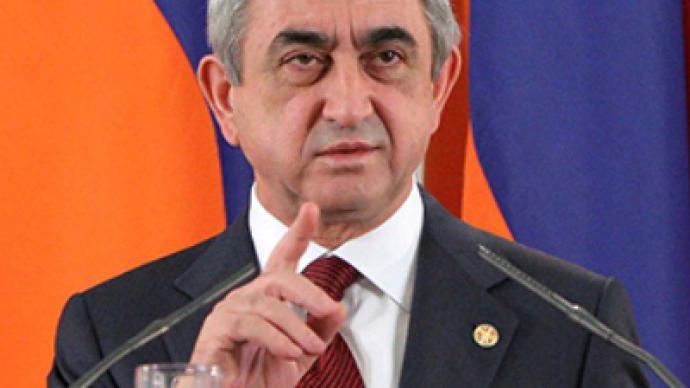Armenia no longer demands Turkey recognize the genocide of its people?

Armenian President said Yerevan is ready to establish diplomatic ties with Turkey without any preconditions, “particularly without the precondition that Turkey should recognize the Armenian genocide”, Interfax reports.
Serzh Sargsyan added that he hoped that Turkey would not drag the ratification out and “will not call the long path covered by the parties into question.” Otherwise, he said, Armenia “will urgently take retaliatory measures provided for by international law.”
The Armenian leader said he gave instructions to relevant institutions to draw up amendments related to the signature, ratification, and cancellation of a number of international treaties.
On January 12, 2010, the country’s Constitutional Court will examine the protocols signed by Armenia and Turkey and hand down a ruling.The protocols which are meant to be ratified by the countries’ parliaments and which were signed in October in Zurich, Switzerland, mean two things: the opening of the border between the states and the establishment of diplomatic ties (“the creation of an intergovernmental bilateral commission with sub-commissions dealing with every possible area of cooperation between the two countries,” the protocol says).
While Yerevan is putting the tragic past aside for the sake of a friendly neighborhood and new trade opportunities, the Armenian community worldwide is split over the move.
The feud stems from an alleged genocide committed by the Ottoman Empire against Armenians at the beginning of the 20th century. Armenians say up to 1.5 million Armenians were slaughtered, more than half of Armenian population living in the Ottoman Empire at the time. The Turks claim the figure is exaggerated and refuse to call it genocide. “We will never accept blame for such a thing,” says Turkish Prime Minister Recep Tayyip Erdogan.
Turkey refers to the massacre in 1915 as “mass deportation” and stands firm on the position that those deaths were war casualties. The Ottoman Empire took part in the First World War (1914-1918) on Germany’s side. The Turkish Empire fell apart in 1923 and was succeeded by the Republic of Turkey.
Twenty-one countries, including Russia, France, Italy, Canada, and most states of the US, have adopted resolutions acknowledging the Armenian genocide as a historical event. In France you risk being sentenced to a year in prison for denying the Armenian genocide. But in order to enjoy diplomatic and wider economic ties with Turkey, Ankara insists Armenia should drop its policy aimed at international recognition of the Armenian genocide.
Normalization of relations between Yerevan and Ankara is one of the conditions of Turkey’s joining the EU – something Ankara is yearning for.
“Wounds and scars will be overcome – first we need to establish diplomatic relations,” says Suat Kiniklioglu, a member of the Turkish Parliament and Deputy Chair of External Affairs.
While the Turks are trying to hush the past, millions of Armenians scattered around the globe as a result of the genocide wonder if it is too big a concession to make for the sake of a more open neighborhood. The Armenian leadership has its own reasoning behind the move, where the economy plays a considerable part.
World leaders generally welcome the warming of relations between Ankara and Yerevan, which could end the century-old Cold War between Turkey and Armenia.
“We are generally glad that relations between Armenia and Turkey have been warming, that [the two nations] are trying to overcome those problems that [concerned them in the 20th century], are showing mutual restraint and are searching for a compromise,” says Russian President Dmitry Medvedev.
Medvedev also noted that it is important that other nations do not think that this process comes at any other nation’s expense.
Speaking at a media conference with Latvian President Valdis Zatlers in the Armenian capital Yerevan on December 10, Sargsyan criticized Turkey for its attempts to tie the settlement of the conflict over Nagorno-Karabakh to the normalization of Armenian-Turkish relations.“These attempts are doomed to failure. If Turkey drags out the ratification process, Armenia will resort to relevant international law provisions,” Interfax news agency quotes him as saying.
“I think [the ratification of the protocols and the establishment of ties] will happen. Perhaps, not too soon – there might be more delays and talks,” Sergey Arutyunov, head of department at the Institute of Ethnic Studies, corresponding member of the Russian Academy of Science told RT.It is impossible to forget about the genocide, but “a pragmatic approach is more important for the Armenian authorities than such symbolic and ideological ones,” Arutyunov said.
“The Armenian business elite are interested – undoubtedly – in opening the border between Armenia and Turkey, in normal economic relations with Turkey and through Turkey, since it is the main transit route to the rest of the world and, first of all, Europe,” he said.
For Turkey, there will be economic benefits, too. However, the main factor that motivates Ankara when making moves to normalize relations with Yerevan, the analyst said, is making the dream of joining the EU come true.












